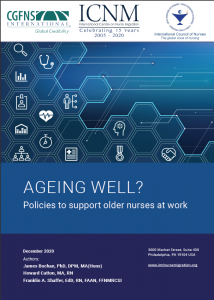Up to 4.7 million nurses worldwide are expecting to retire by 2030. A new report reveals strategies that must be adopted to help them continue in work and keep health services running.
Ageing Well? Policies to Support Older Nurses at Work builds on the World Health Organization’s State of the World’s Nursing (SOWN) report by detailing the policy implications and actions that are necessary to retain older nurses in the workplace.
The report, written by the International Centre on Nurse Migration (ICNM), the International Council of Nurses (ICN), and CGFNS International, Inc., provides a ten-point plan for supporting older nurses in their work (see below).
Lead author Professor James Buchan, adjunct professor at the WHO Collaborating Centre at the University of Technology, Sydney, Australia, said: “We need to improve the retention of older nurses, otherwise we risk losing the most experienced members of the profession at a time when the pandemic has exposed the risk of global nursing shortages.
‘Whereas the overwhelming shortage of nurses worldwide by 2030 will be in low- and middle-income countries, developed countries need to wake up to the fact that 17% of their nursing workforces, that’s 4.7 million nurses, will be considering taking retirement over the next decade.
‘Policies need to be in place to enable individual nurses to ‘age well’, in parallel with policies aimed at overall retention and support of older nurses to be active members of the profession.”
ICN Chief Executive Officer Howard Catton, who also co-authored the report, said:
“This projected shortfall of more than ten million nurses does not take into account the effects of the COVID-19 pandemic. After the past nine months, nurses are exhausted, some have post-traumatic stress disorder, and very many of those who came back to the workforce to help out are not staying. I also suspect that nurses who pre COVID had been intending to work up to their normal retirement age, may now say they have had enough.
‘In the past, rich countries have seen importing nurses from poorer countries as a key part of the solution to address their own shortages. That has never been acceptable when it robs countries with weaker healthcare systems of much needed nursing resources, and a post-pandemic world might also see different migration patterns that mean the usual ‘donor’ countries will no longer perform that role. Each country should aim to be self-sufficient in producing enough nurses to meet their population’s needs.”
Co-author of the report, Dr. Franklin A. Shaffer, President and CEO of CGFNS International, said:
“The need to implement policies that take into consideration an ageing nursing workforce and nurses’ career-cycles is imperative. Understanding the challenges related to their retention and replacement will be critical for the development of policy responses that adequately address the healthcare needs of our changing world. As the SOWN report highlighted, an estimated 4.7 million new nurses will be in demand by the year 2030 just to replace nurses that are expected to retire… not including the estimated 5.9 million nurses that will be needed to address the ever-expanding global shortage. International recruitment of nurses needs to be managed sensibly and ethically, in line with the World Health Organization Managing health workforce migration Global Code of Practice.”
Ten-point plan for supporting older nurses in their work:
- Understanding the workforce profile and employment needs of older nurses
- Avoiding age bias in the recruitment process
- Providing flexible working that meets older nurses’ needs
- Ensuring older nurses have access to professional development and career opportunities
- Ensuring occupational health and safety policies enable staff wellbeing
- Supporting job redesign to reduce workload and stress to optimise the contribution of older nurses
- Maintain pay and benefits that meet older nurses’ needs
- Support older nurses in advanced and specialised practice and mentorship roles
- Maintain succession planning to enable knowledge transfer and leadership development
- Provide retirement planning options and flexible pension provision
Download the press release here
About the International Centre on Nurse Migration
The International Centre on Nurse Migration (ICNM) serves as a comprehensive knowledge resource created by CGFNS International Inc. (CGFNS) in partnership with the International Council of Nurses (ICN). ICNM emphasizes the development, promotion and dissemination of research, policy and information on global nurse migration and human resources in nursing. ICNM occupies a key role in establishing dynamic, effective global and national migration policy and practice that facilitate safe patient care and positive practice environments for nurse migrants. Learn more at www.intlnursemigration.org.
The International Council of Nurses (ICN) is a federation of more than 130 national nurses’ associations representing the millions of nurses worldwide. Operated by nurses and leading nursing internationally, ICN works to ensure quality care for all and sound health policies globally.
About CGFNS International, Inc.
Founded in 1977, Philadelphia-based CGFNS International, Inc. is an immigration-neutral, not-for-profit organization proudly serving as a global standards-setting organization and the largest credentials evaluation organization for nurses and healthcare professionals. Today, CGFNS is a globally recognized authority on the education, licensure, employment, accreditation, certification, and regulation of healthcare professionals in more than 200 countries. CGFNS is an NGO in Consultative Status with the United Nations Economic and Social Council (ECOSOC) and is a member of the Conference of NGOs in Consultative Relationship with the United Nations (CoNGO). For more information, visit www.cgfns.org.



